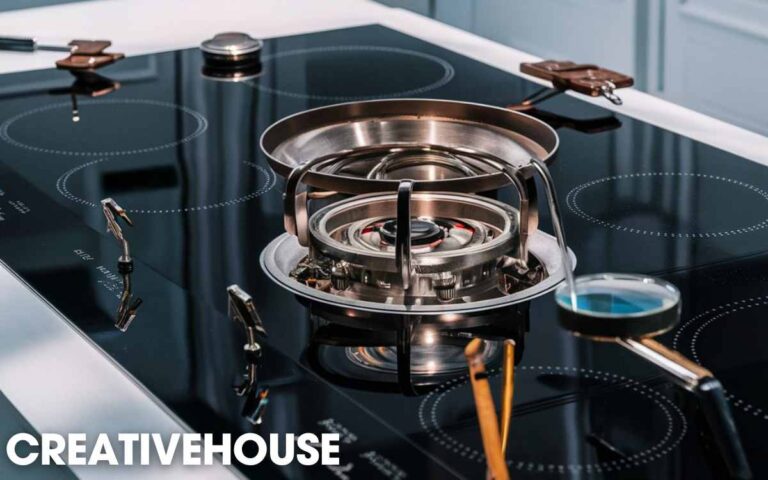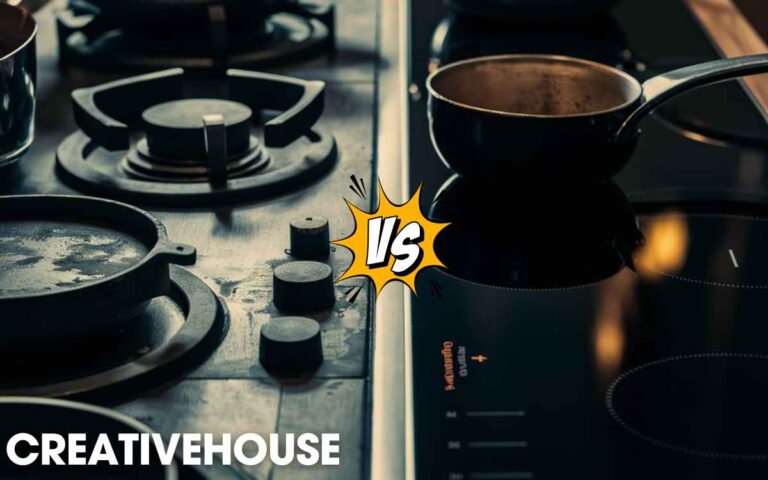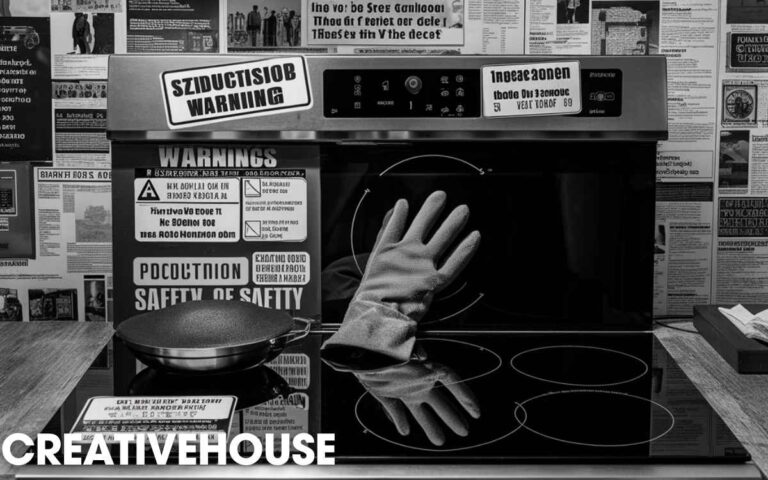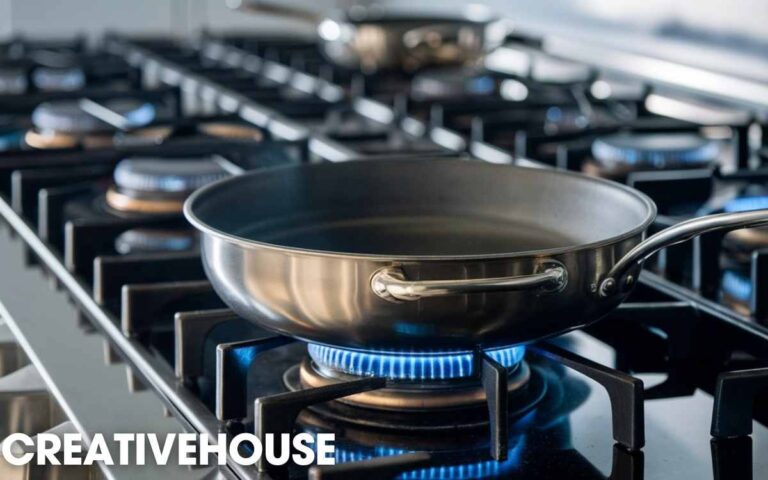Are you hearing a strange noise coming out of your electric stove? It’s not always unsafe if your stove is making a buzzing noise. But, it may point to some problems. A little sound is normal, but too much of it is concerning.
The reasons for an electric stove making buzzing noise are faulty transformer, damaged burner, loose connections, vibrations, electric interference, control panel problems, ventilation issues, and faulty switch or relay.
Key Takeaway
Is It Normal for An Electric Stove to Make a Buzzing Noise?
Noise coming out of your electric stove is a normal event. It depends on the kind of electric stove and the situation in which it occurs.
- Induction Stoves: The pan vibrates due to the magnetic field between the cooktop and pan bottom. So, induction stoves emit a buzzing sound. When the pan is taken out of the cooking zone, this usual noise stops.
- Coil Stoves: Particularly on older types, coil stoves may produce a buzzing sound. It happens when the burner is turned on. This noise is considered normal. It is brought on by coil element vibrations.
- High Power: A buzzing sound could come from an induction or coil stove when it’s cooking on high power. The energy that is transferred from the appliance to the cookware is the cause of this. When the power is switched off, the noise will either subside or cease.
So, a slight buzzing sound from an electric stove is normal. But, the buzzing sound can sometimes be strong. It may also happen when the stove is not in use. If these are the cases, your electric stove has some faults.
8 Reasons Why Is Electric Stove Making Buzzing Noise (Including Fixes)
Here are eight potential causes of buzzing noises coming from your electric stove, along with the fixes:
| Reasons for the Buzzing Noise | Solutions |
| Faulty Transformer | Hire a technician to replace the transformer. |
| Damaged Burner | Replace the heating element. |
| Loose Connections | Tighten any loose connections and replace frayed wires. |
| Vibrations | Use tightly fitted and flat cookware. |
| Electric Interference | Move away electric devices that create interference. |
| Control Panel Problems | Replace or repair the control panel. |
| Ventilation Issue | Clean and install a replacement fan. |
| Faulty Switch and Relay | Repair defective relays or switches. |
1. Faulty Transformer
The voltage converter in your electric stove might be broken. If it is broken or does not work properly, the stove will make buzzing noises.
A buzzing sound, the stove may operate inconsistently. It also may display strange electrical fluctuations.
The Fix:
This problem is among the most prevalent ones. To fix it, though, you’ll need to be a technician. Therefore, get expert help to repair the broken transformer.
The technician will inspect the transformer and determine the problem. After that, he will replace or repair it as needed.
2. Damaged Burner
When your electric stove fails to operate properly, a worn-out heating element may produce a buzzing sound.
If this happens, the stove may exhibit irregular heating. You may also notice slow cooking and visible damage when it is turned on.
The Fix:
Follow these steps carefully:
- First, disconnect the stove’s power cord and turn it off.
- In case it was used lately, let the stove cool.
- Now, find the malfunctioning heating element
- Look for the one that is broken or distorted.
- You should remove the element with caution by unscrewing it.
- To replace the heating element in your stove, buy a compatible one.
- Proceed with the removal and then install the replacement element.
- Check to make sure the buzzing noise has stopped when you plug the stove back in.
3. Loose Connections
Your stove may also buzz because of loose electrical connections. This can cause electricity to flow irregularly.
While the stove is operating, you might notice sporadic sparking. Flickering lights from the connection points are a giveaway of connection problems.
The Fix:
You should examine the internal connections and wiring. Be sure to check for frayed insulation and loose wires. If you find any loose connections, tighten them with the proper tools.
Now, replace any frayed wires with ones that have the same gauge and rating. Now, plug the stove back in and inspect the connections.
4. Vibrations
Pots and pans might be shaking on top of your electric stove. This could be the source of the noise instead of the stove itself.
You can differentiate the noise because cookware makes a different sound when you lift or adjust it.
The Fix:
You should use pots and pans with flat bottoms. This will keep kitchenware from vibrating. Also, be sure to use cookware that fits tightly on the stove’s burners and has an even, flat bottom.
To reduce vibrations, make sure the cookware is centered on the burner. You can also place anti-vibration mats underneath the cookware if needed. Repositioning the cookware is also viable to reduce vibrations and noise.
5. Electrical Interference
Appliances or other electrical gadgets you have kept near the stove may interact with one another. This might also produce a buzzing noise.
Check if the may only makes a buzzing sound when certain appliances are operating concurrently. Also, examine when it is next to an electrical device.
The Fix:
To fix this issue, you should rearrange any adjacent appliances. Also, move the electronic equipment around to make sure that they do not interfere with the electric stove.
If any electronic gadgets are interfering with the stove, move them away to lessen their proximity.
To prevent interference, you can install noise filters. Surge protectors are also good options to install on the impacted appliances.
6. Control Panel Problem
Buzzing sounds could be the consequence of issues with the control panel. Other electronic parts of the stove can also be the reason.
Symptoms include non-responsive buttons and error symbols shown on the display. You might also notice an ongoing buzzing sound that persists long after turning off the stove.
The Fix:
It can be dangerous to try to troubleshoot control panel problems without the necessary knowledge.
To replace or repair the control panel, you should get in touch with a qualified expert. He should identify the problem and repair the control panel’s parts.
7. Ventilation Issue
To regulate heat and smells, some electric stoves come equipped with fans or ventilation systems. If your electric stove has a broken fan, it will create a buzzing sound.
When the fan is operating, the buzzing is more audible. Also, inadequate ventilation might cause your stove to overheat.
The Fix:
Follow these steps to prevent any ventilation issues:
- First, unplug the stove.
- Now, clear out any debris or obstructions from the ventilation system fan.
- Examine if this fixes the problem.
- You might need to get the fan replaced if cleaning doesn’t resolve the issue.
- To order a replacement fan, get in touch with the stove’s manufacturer.
- Now, follow the instructions or get a qualified technician to install the new fan.
- Finally, re-plug the stove and give it a test.
8. Faulty Switch and Relay
Your electric stove’s switches and relays regulate various operations. These may malfunction and produce a buzzing noise.
Certain stove features may not function properly if this happens. Additionally, specific operations or settings may cause buzzing.
The Fix:
You must find which switches or relays are the source of the buzzing sound. Usually, you can find these parts behind the control panel.
Check for any obvious damage or burned parts on the switches and relays. To conduct this inspection, you should maintain proper safety practices.
If you find defective relays or switches, get replacement parts from the manufacturer. Finally, install them in place of the damaged switch and relay.
Frequently Asked Questions -FAQs
Is it hazardous if my electric stove is making a buzzing noise?
The sound of a buzzing sound by itself is not always harmful.
If my stove is generating a buzzing sound, can I still use it?
No. It might result in further harm or safety risks.
What risks come with disregarding an electric stove’s buzzing noise?
It might get too hot and ignite a fire.
How long does it take to fix an electric stove?
You can finish the majority of repairs in a few hours.





